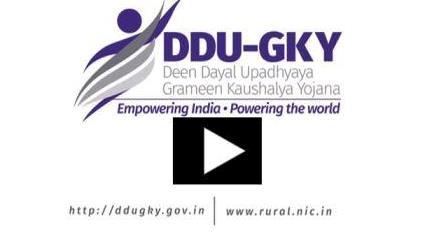Deen Dayal Upadhyaya Grameen Kaushalya Yojana
Deen Dayal Upadhyaya Grameen Kaushalya Yojana
According to Census 2011, India has 55 million potential workers between the ages of 15 and 35 years in rural areas. At the same time, the world is expected to face a shortage of 57 million workers by 2020. This presents a historic opportunity for India to transform its demographic surplus into a demographic dividend. The Ministry of Rural Development implements DDU-GKY to drive this national agenda for inclusive growth, by developing skills and productive capacity of the rural youth from poor families.
There are several challenges preventing India’s rural poor from competing in the modern market, such as the lack of formal education and marketable skills. DDU-GKY bridges this gap by funding training projects benchmarked to global standards, with an emphasis on placement, retention, career progression and foreign placement.
Features of Deen Dayal Upadhyaya Grameen Kaushalya Yojana
Enable Poor and Marginalized to Access Benefits
- Demand led skill training at no cost to the rural poor
Inclusive Program Design
- Mandatory coverage of socially disadvantaged groups (SC/ST 50%; Minority 15%; Women 33%)
Shifting Emphasis from Training to Career Progression
- Pioneers in providing incentives for job retention, career progression and foreign placements
Greater Support for Placed Candidates
- Post-placement support, migration support and alumni network
Proactive Approach to Build Placement Partnerships
- Guaranteed Placement for at least 75% trained candidates
Enhancing the Capacity of Implementation Partners
- Nurturing new training service providers and developing their skills
Regional Focus
- Greater emphasis on projects for poor rural youth in Jammu and Kashmir (HIMAYAT),
- The North-East region and 27 Left-Wing Extremist (LWE) districts (ROSHINI)
Standards-led Delivery
- All program activities are subject to Standard Operating Procedures that are not open to interpretation by local inspectors. All inspections are supported by geo-tagged, time stamped videos/photographs.
Beneficiary Eligibility
- Rural Youth:15 - 35 Yrs
- SC/ST/Women/PVTG/PWD: upto 45 Yrs
Implementation Model
DDU-GKY follows a 3-tier implementation model. The DDU-GKY National Unit at MoRD functions as the policy-making, technical support and facilitation agency. The DDU-GKY State Missions provide implementation support; and the Project Implementing Agencies (PIAs) implement the programme through skilling and placement projects.
Project Implementing Agencies (PIAs)
Necessary Conditions & Eligibility Criteria
- Registered under Indian Trust Acts or any State Society Registration Act or any State Cooperative Societies or Multi - State Cooperative Acts or the Companies Act 2013 or the Limited Liability Partnerships Act 2008 OR Government or a semi - government organization at the State and National Level
-
Existence as an operational Legal Entity in India for more than 3 financial years (Not applicable for NSDC Partners)
- Positive Net Worth for atleast 2 out of last 3 financial years (Not applicable for NSDC Partners)
-
Turnover in excess of at least 25% of the proposed project
In funding projects, priority is given to PIAs offering
- Foreign Placement
- Captive Employment: Those PIAs or organizations that take up skill training to meet internal ongoing HR needs
- Industry Internships: Support for internships with co-funding from industry
- Champion Employers: PIAs who can assure skill training and placement for a minimum of 10,000 DDU-GKY trainees in a span of 2 years
- Educational Institution of High Repute: Institutes with a minimum National Assessment and Accreditation Council (NAAC) grading of 3.5 or Community Colleges with University Grants Commission (UGC)/ All India Council for Technical Education (AICTE) funding willing to take up DDU-GKY projects.
Project Funding Support
DDU-GKY provides funding support for placement linked skilling projects that address the market demand with funding support ranging from Rs. 25,696 to over Rs. 1 lakh per person, depending on the duration of the project and whether the project is residential or non-residential. DDU-GKY funds projects with training duration from 576 hours (3 months) to 2304 hours (12 months).
Funding components include support for training costs, boarding and lodging (residential programmes), transportation costs, post-placement support costs, career progression and retention support costs. For detailed guidelines, click here.
Training Requirements
- DDU-GKY funds a variety of skill training programs covering over 250 trades across a range of sectors such as Retail, Hospitality , Health, Construction, Automotive, Leather, Electrical, Plumbing, Gems and Jewelry, to name a few. The only mandate is that skill training should be demand based and lead to placement of at least 75% of the trainees.
- The trade specific skills are required to follow the curriculum and norms prescribed by specified national agencies: the National Council for Vocational Training and Sector Skills Councils.
- In addition to the trade specific skills, training must be provided in employability and soft skills, functional English and functional Informational technology literacy so that the training can build cross cutting essential skills.
Scale and Impact
- DDU-GKY is applicable to the entire country. The scheme is being implemented currently in 13 States/UTs across 460 districts partnering currently with 82 PIAs covering 18 sectors. To know the project implementation statistics, click here.
For more information, visit www.ddugky.gov.in
Source: DDU-GKY
Related resources
Last Modified : 2/28/2020
This topic provides about *99# Service- Innovative...
This topic provides information related to steps t...
This topic covers information related to Acute res...
This topic provides information about Zero tillage...

